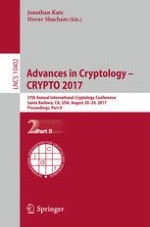2017 | OriginalPaper | Buchkapitel
Laconic Oblivious Transfer and Its Applications
verfasst von : Chongwon Cho, Nico Döttling, Sanjam Garg, Divya Gupta, Peihan Miao, Antigoni Polychroniadou
Erschienen in: Advances in Cryptology – CRYPTO 2017
Aktivieren Sie unsere intelligente Suche, um passende Fachinhalte oder Patente zu finden.
Wählen Sie Textabschnitte aus um mit Künstlicher Intelligenz passenden Patente zu finden. powered by
Markieren Sie Textabschnitte, um KI-gestützt weitere passende Inhalte zu finden. powered by
